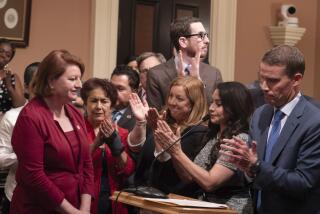Rose Queen Judging by Men Only Criticized : Tournament: County organization asks why only one woman has ever served on the prestigious panel.
Down through the century-long history of the Tournament of Roses, candidates for Rose Queen and her court do their best to win approval from the panel of nine men who determine who will preside over the Rose Parade.
To a man, this year’s judges are men. Ditto, last year. And the year before.
Only once, in 1988, has a woman served on the prestigious Queen and Court Committee that members of the Tournament of Roses Assn. consider the sugar plum among plum assignments in the volunteer association.
Enter the Los Angeles County Commission for Women, a citizens’ panel appointed by members of the Board of Supervisors. On Monday, for the second year in a row, the commission questioned why the committee has no women members.
The commission involved itself in the issue last year at the behest of June Dunbar, an appointee of Supervisor Deane Dana, who was upset by a news photo of a young woman standing demurely before a panel of male judges.
“For a contest in which virtually all the candidates are females and in which the winner has been selected to represent the women of Southern California, it would be only appropriate to have a gender-balanced panel,” the commission wrote in a letter to tournament officials.
“We got no answer,” Dunbar said. The matter was dropped.
This year, when similar photos appeared, Commission President Edna Aliewine , sent a new letter. “The lack of a balanced perspective does not bode well for the young women contestants who must look up to an all-male panel of judges for a stamp of approval,” the commission wrote to Robert L. Cheney, president of the Pasadena Tournament of Roses.
Four days later, John A. B. French, executive director of the tournament, wrote back that tournament directors would be happy to meet with the commission. On Monday, with little discussion, the commission voted to ask representatives of the tournament to appear at one of their meetings.
Neither French nor Cheney was available for comment Monday. But tournament officials explained that the makeup of the committee is based on seniority and written “grades” given them by chairmen of their prior committees.
“This seniority and performance plan has worked for over 100 years,” said Frosty Foster, assistant executive director for administration and membership. “We think it’s what keeps our association strong because people know that if they don’t work, then they know they won’t get promoted up.”
Because women were not admitted to the association as active members until 1973, few women have the combination of seniority and grades to win a seat on the highly desirable committee, he said. The members on this year’s Queen and Court Committee have an average of 16 years’ service each.
Two women were among those asked to join the committee this year, but both turned it down because they worked full time and did not have the 30 to 40 hours a week required for the job.
The Pasadena association, one of Southern California’s oldest and most traditional volunteer organizations, draws more applicants each year than it has spots to fill. Those accepted are expected to pay dues and work their way up an intricate ladder until found deserving of powerful posts that could conceivably lead to the presidency of the organization.
Merely being a member of the 875-member association is considered a plus on a resume. About 190 members are women.
“I am definitely in full agreement that women should be involved on the Queen and Court Committee,” said Don Hopf, a volunteer with 27 years of service who chairs this year’s Queen and Court Committee. “But I don’t think women should be moved ahead of the men who have served their time just to serve some sort of quota system. . . . If we moved ladies into that committee, we would be moving them up over eligible men.”
While the male judges are sitting out front interviewing candidates, their wives are usually “running the tryouts behind the scenes,” he said. When the single woman judge, Barbara Piper, was a member, her husband also participated actively, Hopf said.
Women will start getting routine appointments to the committee, Foster said. “But it will be down the road a bit.”


